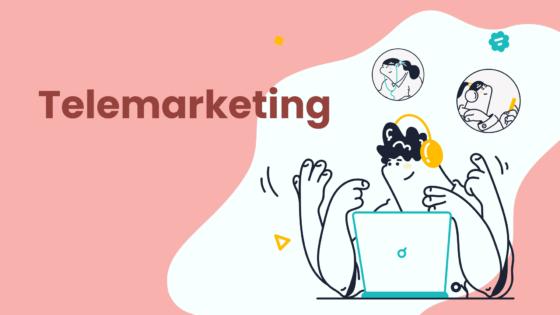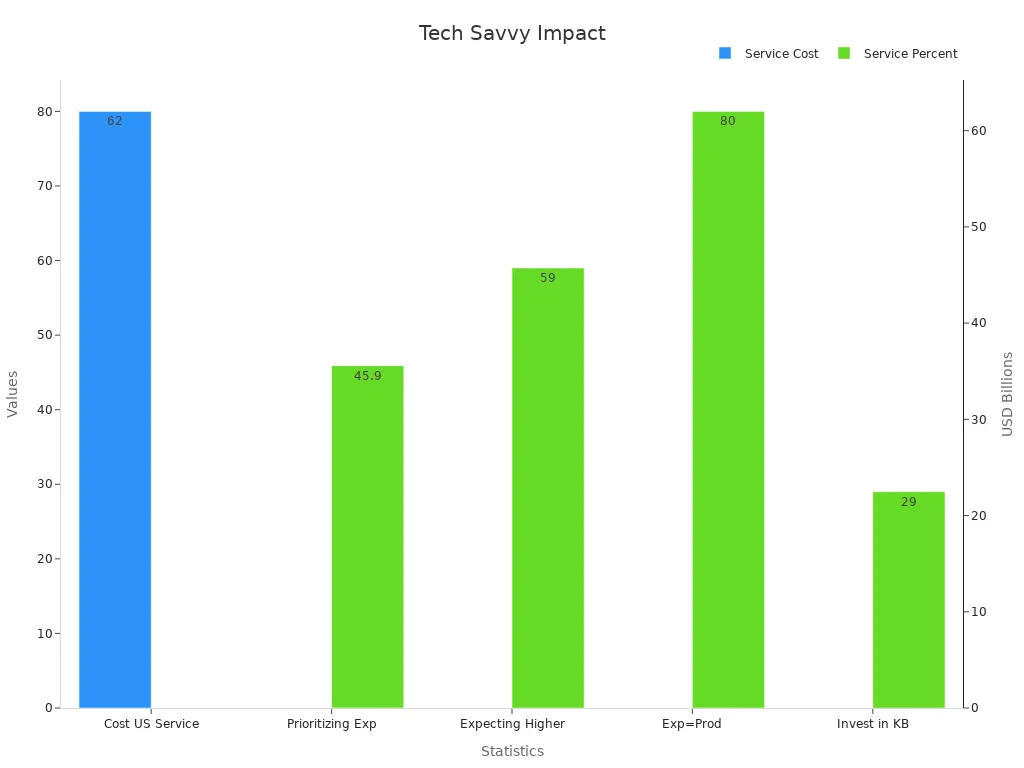Top 8 Skills Every Employee Needs for Great Customer Service

You want to stand out with great customer service in 2025? Here are the 8 customer service skills every employee should know: empathy, active listening, clear communication, problem-solving, adaptability, emotional intelligence, product knowledge, and tech savviness.
| Customer Service Skill | Why It Matters in 2025 |
|---|---|
| Empathy | 70% of buying decisions are influenced by emotions (Forbes). |
| Active Listening | 93% of teams say customer expectations are higher than ever. |
| Clear Communication | 86% of consumers expect seamless communication across channels. |
| Problem-Solving | 80% of people experience negative service when problems are not solved. |
| Adaptability | 87% of reps report more digital channel use by customers. |
| Emotional Intelligence | 95% of purchasing decisions are subconscious (Harvard Business School). |
| Product Knowledge | 48% leave brands due to poor personalization or info (Accenture). |
| Tech Savviness | 57% expect automated voice assistants to become a top channel. |
You can master these essential customer service skills, even with new tech and rising expectations. Sobot and Sobot AI give you advanced tools, like unified workspaces and AI-powered automation, so you can deliver great customer service across every channel. These skills help you connect, solve problems, and create amazing customer experiences—no matter your role.
8 Customer Service Skills Every Employee Should Know
Overview
You might wonder what makes some companies stand out when it comes to customer experience. The answer often comes down to the 8 customer service skills every employee should know. These skills are:
- Empathy
- Active listening
- Clear communication
- Problem-solving
- Adaptability
- Emotional intelligence
- Product knowledge
- Tech savviness
Each skill helps you connect with customers, understand their needs, and solve their problems quickly. For example, empathy lets you see things from the customer’s point of view, while problem-solving helps you find the best solution fast. Active listening and clear communication make sure you don’t miss important details. Adaptability keeps you ready for any change, and emotional intelligence helps you handle tough situations calmly. Product knowledge and tech savviness let you answer questions and use the latest tools, like Sobot’s unified workspace, to make your job easier.
Why These Skills Matter
Mastering these essential customer service skills is not just about being nice. It’s about building trust and loyalty. Did you know that 96% of customers say great service is key for brand loyalty? Almost 70% of people will switch brands after just one bad experience (PWC). When you use these skills, you help your company stand out. Companies like Southwest Airlines and Apple have shown that quick problem-solving, personal attention, and strong communication lead to happy customers and business growth.
Tip: Companies that focus on these 8 customer service skills every employee should know often see higher customer satisfaction and better reviews. Sobot’s AI-powered solutions help teams practice these skills every day, making it easier to deliver great service across every channel.
A recent study found that training employees in real-life skills, not just theory, leads to better job performance and happier customers. When you practice these skills, you don’t just help your company—you build your own confidence and career, too.
Empathy

Definition
Empathy means you put yourself in the customer’s shoes. You try to feel what they feel and understand their point of view. In customer service, empathy is more than just being nice. It is about showing customers that you care about their problems and want to help. When you use empathy, you make every customer feel heard and valued. This skill helps you connect with people and build trust.
Why It Matters
Empathy is a game-changer for customer service. Studies show that when you show empathy, customers feel more satisfied and loyal. One study found that employee empathy boosts customer satisfaction and loyalty, especially when customers also show empathy. This creates stronger relationships and helps both sides forgive small mistakes. Empathy also helps you build customer relationships that last. When you use empathy, you make customers feel special, which is the heart of personalization.
In today’s world, customers reach out on many channels—chat, phone, email, and social media. Sobot’s omnichannel solution lets you see the whole customer journey in one place. This helps you understand their needs and respond with empathy, no matter how they contact you. Companies that focus on empathy see better business results. The top 10 most empathetic companies grew their value twice as fast as others (Harvard Business Review).
Note: Empathy is not just a “nice-to-have.” It is a key skill for building trust, loyalty, and strong relationships with your customers.
How to Improve
You can get better at empathy with practice. Here are some tips:
- Listen carefully to what customers say. Pay attention to their words and feelings.
- Use Sobot’s unified workspace to see all customer info in one place. This helps you understand their history and needs.
- Ask questions to show you care and want to help.
- Use phrases like “I understand how you feel” or “That sounds frustrating.”
- Try journey mapping or customer personas in Sobot’s platform to see things from the customer’s side.
When you use these skills, you make every interaction more personal and meaningful. Over time, you will see stronger relationships and happier customers.
Active Listening
What It Is
Active listening means you pay close attention to what customers say and how they say it. You do not just hear words—you notice feelings, tone, and even what is not said. This skill helps you understand customer needs better. When you practice active listening, you show real attentiveness and care. You ask questions, repeat back what you heard, and make sure you get the message right. In customer communication, this makes people feel valued and respected.
Impact
Active listening has a big effect on customer focus and satisfaction. Research shows that 59% of customers say personalized service, shaped by good listening, changes their buying decisions (Infosys). When you listen well, you catch small details and emotions. This helps you solve problems faster and build trust. Studies also found that active listening leads to higher customer satisfaction and even bigger tips for service workers. Good listening can stop problems before they grow and keeps customers coming back. In fact, 60% of business problems come from poor communication, so strong listening skills are key for great customer service.
Tips
You can get better at active listening with practice. Here are some ways to build this skill:
- Give your full attention. Put away distractions and focus on the customer.
- Use Sobot’s unified workspace to see all customer communication in one place. This helps you track past issues and understand customer needs quickly.
- Ask follow-up questions to show you care about their concerns.
- Paraphrase what the customer says. For example, “So you’re saying the order arrived late, is that right?”
- Use positive body language if you are on video or in person. Nod, smile, and keep eye contact.
- Let the customer finish speaking before you respond.
Tip: Collaboration with your team can help you learn from others and improve your listening skills. Share feedback and practice together to boost your attentiveness and customer focus.
When you use these tips, you make every customer feel heard. This leads to better collaboration, stronger relationships, and more successful customer communication.
Clear Communication
Definition
Clear communication means you share information in a way that is easy to understand. You use simple words and short sentences. You avoid jargon or confusing terms. When you speak or write, you make sure your message is direct and honest. This skill helps you avoid misunderstandings and keeps everyone on the same page. Strong communication skills help you build trust with customers and teammates.
Importance
Clear communication is one of the most important skills in customer service. When you explain things well, customers feel confident and valued. They know what to expect and what to do next. Studies show that clear communication leads to better results for both you and your customers:
- In 2021, 70% of customers said they prefer talking to agents who speak their language.
- A 2022 study found a 20% jump in customer loyalty when companies use clear communication to build rapport.
- A 2023 report showed that businesses with effective communication solve problems 30% faster.
- In late 2022, 80% of consumers said they would return to a brand after receiving excellent service.
| Metric/Statistic | Description | Quantitative Value |
|---|---|---|
| Poor communication contribution to hospital adverse events (USA) | Percentage of hospital adverse events linked to poor communication | Over 60% |
| NHS litigation costs due to patient safety incidents (UK) | Financial loss attributed to patient safety incidents including communication failures | £1.63 billion (2017-2018) |
| NHS medication error costs (UK) | Annual cost of medication errors related to communication issues | Over £98 million per year |
| US medication error costs | Annual cost of medication errors in the US healthcare system | Over $17 billion per year |
| Avoidable sepsis deaths in UK linked to poor communication | Number of deaths annually attributed to communication failures | 48,000 deaths |
These numbers show how much clear communication matters. Mistakes can cost money and even lives. In customer service, clear communication helps you avoid errors and keeps customers happy.
Best Practices
You can improve your communication skills with a few simple steps:
- Speak slowly and use simple words.
- Check that the customer understands. Ask questions like, “Does that make sense?”
- Repeat important details to make sure nothing gets missed.
- Use Sobot’s unified workspace to keep all messages and customer info in one place. This helps you stay organized and clear.
- Write short emails or chat messages. Break up long information into bullet points or lists.
- Listen first, then respond. This keeps your answers focused and helpful.
Tip: Practice makes perfect. Try explaining a product or service to a friend or family member. If they understand, you are on the right track!
Clear communication builds trust and shows your customer focus. When you use these best practices, you help customers feel heard and supported every time.
Problem-Solving Abilities

What Is Problem-Solving
Problem-solving means you find answers to customer issues quickly and clearly. In customer service, you use your skills to listen, understand the problem, and figure out the best solution. Sometimes, you need to think fast. Other times, you need to look up information or ask for help. Good problem-solving abilities help you handle tough questions and make customers feel confident in your support.

Sobot’s AI-powered Voice/Call Center gives you tools to solve problems faster. You can see all customer details in one place, use smart call routing, and even get help from AI-powered voicebots. These features let you focus on the real issue and fix it right away.
Why It Matters
When you solve problems well, customers trust you more. They feel happy and want to come back. The Issue Resolution Rate (IRR) shows how many customer problems you fix out of all the ones reported. A high IRR means you work fast and get things done right. This leads to better customer satisfaction and helps your company grow.
Here’s a quick look at how different industries do with problem-solving:
| Industry Sector | Average Resolution Rate | Key Factors Affecting Resolution Speed |
|---|---|---|
| Retail | ~78% | Simpler issues, straightforward queries |
| Telecom | ~61% | Complex technical problems |
| Tech Support | 65-70% | Balance of speed and thoroughness |
When you use strong problem-solving abilities, you build trust and loyalty. Studies show that customers are more likely to stick with brands that solve their problems quickly and clearly. In fact, trust ratings go up when companies show competence and clear communication.
Steps to Improve
You can get better at problem-solving with practice and the right tools. Try these steps:
- Listen to the customer and ask questions to understand the real problem.
- Use Sobot’s unified workspace to check past issues and find answers fast.
- Keep your knowledge base updated so you don’t repeat mistakes.
- Personalize your response. Don’t just use scripts—talk to the customer like a real person.
- Follow up after you solve the problem to make sure the customer is happy.
Tip: Agilent, a leader in life sciences, improved their customer service by using Sobot’s omnichannel workbench and AI chatbot. They saw a sixfold increase in efficiency and a 95% customer satisfaction score. Their team could focus on complex issues while the AI handled routine questions. This shows how the right technology and strong problem-solving abilities can make a big difference.
With these skills and tools, you can solve problems faster, make customers happier, and help your company succeed.
Adaptability
Meaning
Adaptability means you can adjust to new situations, changes, or challenges without losing your cool. In customer service, you often face surprises—maybe a new tool, a sudden rush of calls, or a change in company policy. When you have adaptability, you handle these changes with confidence. You stay open to learning and try new ways to solve problems. This skill helps you keep up with the fast pace of today’s digital world.
Value
Adaptability is a must-have skill for anyone who wants to succeed in customer service. Companies that adapt quickly to market changes often see big rewards. For example, Netflix switched from DVDs to streaming during the 2008 financial crisis and became a leader in entertainment. Apple keeps growing by changing its products to match what customers want. Studies show that teams with adaptability and strong collaboration can boost sales by up to 30% and respond faster to new trends. Leaders who use real-time data and encourage open communication help their teams make smart decisions and stay ahead of the competition. When you build adaptability, you also attract creative people who love to work together and solve problems.
Tip: Sobot’s omnichannel solution helps you stay adaptable by bringing all your customer interactions into one place. You can switch between channels, use new tools, and keep your customer focus strong—even when things change fast.
How to Build
You can grow your adaptability with practice. Try these steps:
- Stay curious. Ask questions and look for new ways to do your job.
- Join training sessions or role-playing activities to practice new skills.
- Work closely with your team. Good collaboration makes it easier to handle change.
- Use feedback from customers and coworkers to improve.
- Set flexible goals and be ready to adjust your plans.
Sobot supports your adaptability by offering tools that make it easy to learn and use new features. With a unified workspace and AI-powered insights, you can handle changes smoothly and keep delivering great service.
Emotional Intelligence
What It Is
Emotional intelligence means you can recognize, understand, and manage your own feelings and the feelings of others. In customer service, this skill helps you stay calm, read the mood of the customer, and respond in a way that makes them feel heard. You use emotional intelligence to spot when someone feels upset or happy, and you adjust your approach to match their needs. This skill goes beyond just being nice. It helps you turn tough conversations into positive experiences. When you use emotional intelligence, you show real customer focus and make every interaction feel personal.
Benefits
You might wonder why emotional intelligence matters so much in customer service. Here are some real-world examples and facts:
- Zappos once sent flowers and a condolence note to a customer, showing how emotional intelligence can create memorable moments.
- Ritz-Carlton gives employees the power to spend up to $2,000 to make customers happy, using emotional intelligence to meet emotional needs.
- Companies that train employees in emotional intelligence see higher customer satisfaction, stronger brand loyalty, and less customer churn.
- Studies show that emotional intelligence can boost brand trust by 52% and increase decision-making by 31%. Brand loyalty can jump by almost 49% when you use these skills.
- AI-powered tools, like Sobot’s sentiment analysis, help agents spot emotions in real time and respond with empathy. This leads to a 20% increase in customer satisfaction scores and better Net Promoter Scores (Forrester, McKinsey, PwC).
When you use emotional intelligence, you help customers feel understood and valued. This builds trust and keeps them coming back.
How to Develop
You can build emotional intelligence with practice and the right support. Here are some ways to grow this skill:
- Try role-playing with your team to practice handling different emotions.
- Ask for feedback from customers and coworkers to see how you can improve.
- Use Sobot’s AI-powered tools to get real-time insights into customer emotions. This helps you adjust your approach and deliver better service.
- Take part in training sessions that focus on empathy, communication, and customer focus.
- Recognize and validate customer feelings. Simple phrases like “I understand how you feel” can make a big difference.
Tip: Emotional intelligence is not just a natural talent. You can learn and improve it, just like any other skills. The more you practice, the better you get at turning every customer interaction into a positive experience.
Product Knowledge
Definition
Product knowledge means you know your company’s products or services inside and out. You understand how things work, what features matter, and how each product helps customers. When you have strong product knowledge, you can answer questions, solve problems, and give advice with confidence. This skill is a must-have for anyone who wants to deliver great customer service.
Why It’s Key
You build customer trust when you show deep product knowledge. Customers want to feel sure that you know what you’re talking about. If you can explain features, suggest the right options, or fix issues fast, people will come back to you again and again. A Nordstrom case study showed that Adrian Quinones Rivas used his product knowledge to help customers pick the best shoes. His advice made customers feel confident and happy with their choices. Without this skill, customers might get frustrated and leave.
Employees who know their products well can handle tough questions, explain benefits, and solve problems quickly. This approach leads to higher customer satisfaction and loyalty. Companies often see better sales and stronger customer focus when their teams have strong product knowledge.
How to Stay Updated
You need to keep your product knowledge fresh. Products change, new features launch, and customer needs shift. Here’s how you can stay on top:
- Use Sobot’s unified workspace to see the latest product updates and customer info in one place.
- Check real-time dashboards and analytics to spot trends and common questions.
- Join training sessions or watch short videos about new features.
- Read customer feedback and reviews to learn what matters most.
- Work with your team to share tips and updates.
Data-driven tools help you spot buying patterns, track feature use, and personalize your support. Sobot’s analytics make it easy to find what customers ask about most, so you can focus your learning. When you use these skills, you help customers faster and build stronger relationships.
Tech Savviness
What It Means
Tech savviness means you feel comfortable using digital tools, apps, and new technology at work. You know how to use things like AI chatbots, online dashboards, and smart phones to help customers. You don’t need to be a computer expert, but you should feel confident trying new software or features. In customer service, tech-savvy employees use tools that make their jobs easier and help them deliver better support. For example, Sobot’s Voice/Call Center lets you manage calls, track customer info, and use AI-powered voicebots—all in one place. When you have these skills, you can solve problems faster and keep your customer focus strong.
Importance in 2025
Tech savviness is not just a bonus anymore—it’s a must-have. More customers expect fast, digital service. Companies invest in new technology to meet these needs. Check out these numbers:
| Statistic / Insight | Value / Detail | Source / Implication |
|---|---|---|
| Annual cost of poor customer service to US companies | $62 billion | CustomersFirstAcademy.com |
| Businesses prioritizing customer experience for next 5 years | 45.9% | SuperOffice.com |
| Consumers expecting higher service levels amid digital transformation | 59% | TheKeenFolks.com |
| Consumers valuing customer experience as much as the product | 80% | Salesforce State of the Connected Customer Report |
| Global support teams planning to invest in knowledge base enhancement | 29% | Intercom Customer Service Trends Report 2024 |

Even in jobs like plumbing, 89% of homeowners now prefer companies that offer digital scheduling and AI-powered support. This shows how important tech skills are for every industry. Sobot’s Omnichannel Solution helps you connect with customers on chat, phone, email, and social media—all from one dashboard. You stay organized and never miss a message.
How to Improve
You can build your tech savviness with a few simple steps:
- Try out new tools at work, even if they seem tricky at first.
- Ask for training or watch short videos to learn about new features.
- Use Sobot’s unified workspace to practice switching between channels and using AI chatbots.
- Work with your team to share tips and help each other learn.
- Stay curious and ask questions when you see something new.
Tip: The more you practice, the easier it gets. You don’t need to know everything—just keep learning and stay open to change. These skills will help you keep your customer focus sharp and make your job more fun.
When you master great customer service skills, you build strong relationships and boost customer satisfaction. Companies like Microsoft and ADP have shown that focusing on customer success and strong communication skills leads to better customer retention and customer loyalty. You can keep learning and growing by listening to customer feedback and adapting to new tools. Sobot gives you everything you need to deliver great customer service and create lasting relationships. Great customer service drives business growth and turns every customer into a loyal fan.
FAQ
What is the most important skill for great customer service?
Empathy stands out as the top skill. When you show empathy, you connect with customers and build trust. Companies with high customer focus see up to 60% higher loyalty rates (Forbes).
How can I improve my customer focus every day?
Start by listening closely and asking questions. Use tools like Sobot’s unified workspace to track customer needs. When you focus on each person, you solve problems faster and make every interaction count.
Why does customer focus matter for business growth?
Customer focus helps you spot trends and fix issues before they grow. Brands that put customers first often see higher sales and better reviews. Sobot’s analytics help you measure satisfaction and find ways to improve.
How does Sobot support customer focus in daily work?
Sobot brings all your customer messages into one place. You can see chat, email, and calls together. This makes it easy to keep your customer focus strong and respond quickly, no matter the channel.
Can technology really boost customer focus?
Yes! AI-powered tools like Sobot’s chatbot handle simple questions, so you can spend more time on complex needs. This lets you give better service and keep your customer focus sharp, even during busy times.
See Also
Best Customer Service Software Solutions To Use In 2024
Effective Strategies To Improve Live Chat Customer Experience
How To Select The Right Social Media Service Software